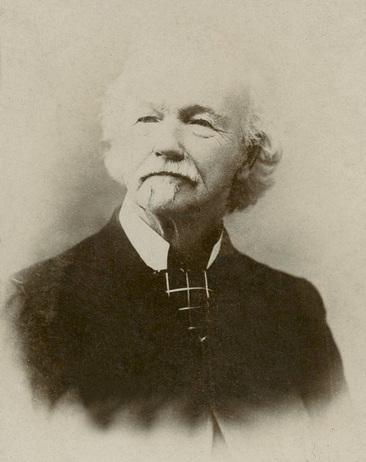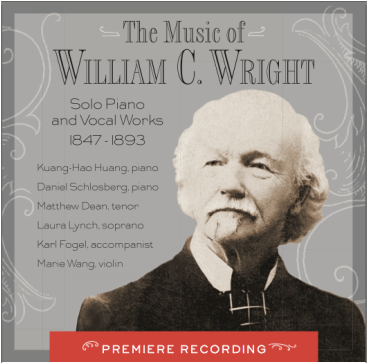The Music of William C. Wright: Solo Piano and Vocal Works 1847-1893

William C. Wright, c. 1890s.
Photograph courtesy of Mary Rogers.
Some of the most poignant and revealing moments in Frank Lloyd Wright's Autobiography appear in his stories of the very musical household in which he was raised -- memories of piano lessons, family sing-alongs ("happy riots"), arduous organ-bellow pumping marathons and ensemble rehearsals. All of these memories revolve around his father, William C. Wright -- a minister, lawyer, musician and composer who wrote and published songs, piano pieces and organ works for almost fifty years.
Throughout his life, music was William Wright's greatest passion. In addition to his compositions, he also wrote instructional books on piano method, organ technique, and proper vocal production. Sometimes, his works were published by professional publishers. At others, he published and distributed them himself, using his own printing press -- his production staff at one point including the young Frank. William taught music wherever he went, whether as a private teacher or overseer of a music school.
Ultimately, William Wright's impact on his son was formidable. The lessons that he taught about music were especially potent, working their way into Frank's fundamental notions of architecture. Today, we recognize music as one of Frank Lloyd Wright's most important influences. Music was, as Wright described it, his "sympathetic friend" -- one of the longest lasting and most dependable, in fact, of all of his personal and professional relationships.
Throughout his life, music was William Wright's greatest passion. In addition to his compositions, he also wrote instructional books on piano method, organ technique, and proper vocal production. Sometimes, his works were published by professional publishers. At others, he published and distributed them himself, using his own printing press -- his production staff at one point including the young Frank. William taught music wherever he went, whether as a private teacher or overseer of a music school.
Ultimately, William Wright's impact on his son was formidable. The lessons that he taught about music were especially potent, working their way into Frank's fundamental notions of architecture. Today, we recognize music as one of Frank Lloyd Wright's most important influences. Music was, as Wright described it, his "sympathetic friend" -- one of the longest lasting and most dependable, in fact, of all of his personal and professional relationships.

"The Music of William C. Wright: Solo Piano and Vocal Works 1847-1893" features roughly half of the known repertory and spans his nearly fifty-year compositional career. Frequently composed for his own piano or voice students, these works are not only a tuneful and entertaining introduction to 19th-century American parlor music but also the most insightful and nuanced testament to the character and personality of their composer.
Funded in part through a successful Kickstarter campaign that attracted press coverage in both the U.S. and Europe, the twenty-one tracks on this recording are complemented by the essay and historical photographs found in the liner notes, ultimately creating a portrait of William C. Wright far different from that found in Frank Lloyd Wright's Autobiography.
The recording is graced with an exceptional roster of performers.
Individual copies of "The Music of William C. Wright" may be ordered through CDBaby after March 1st, 2013. Bulk and wholesale inquiries may be made directly through Permelia Records.
